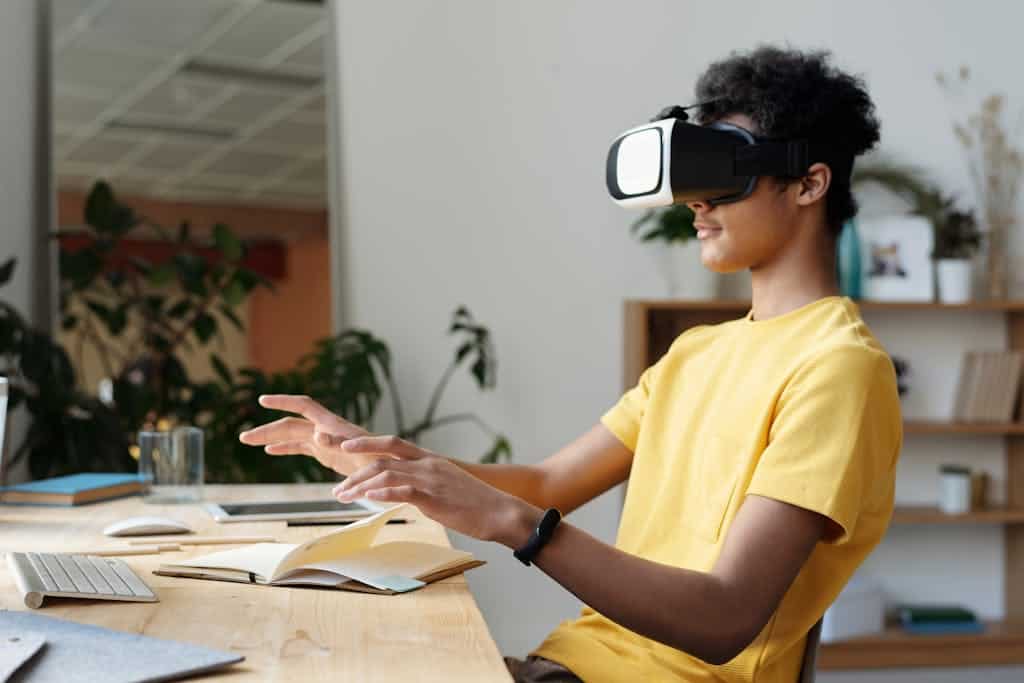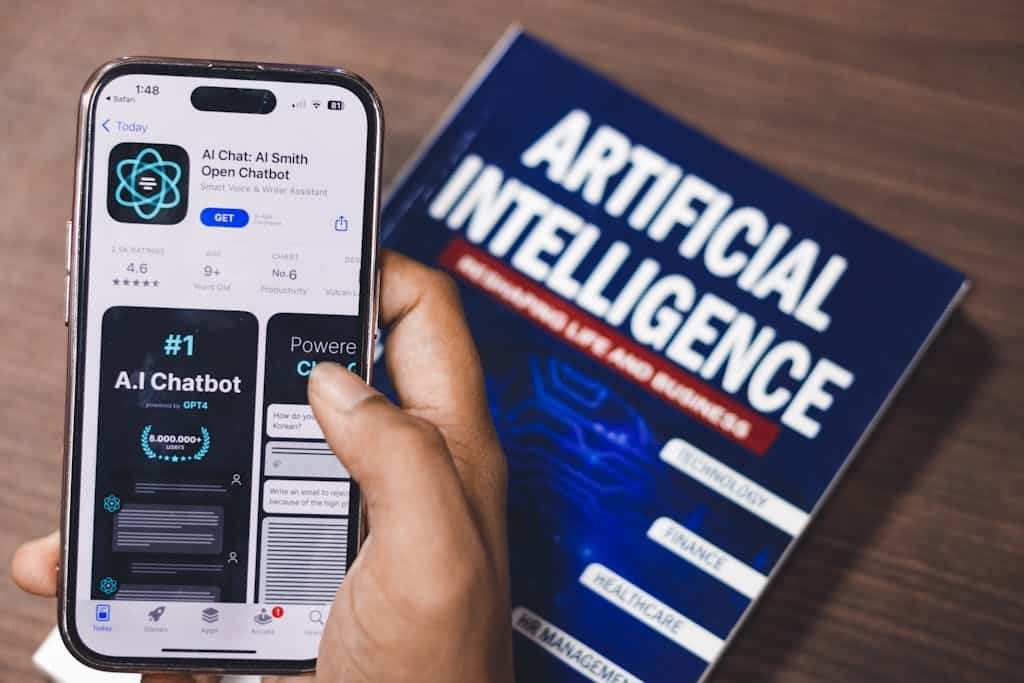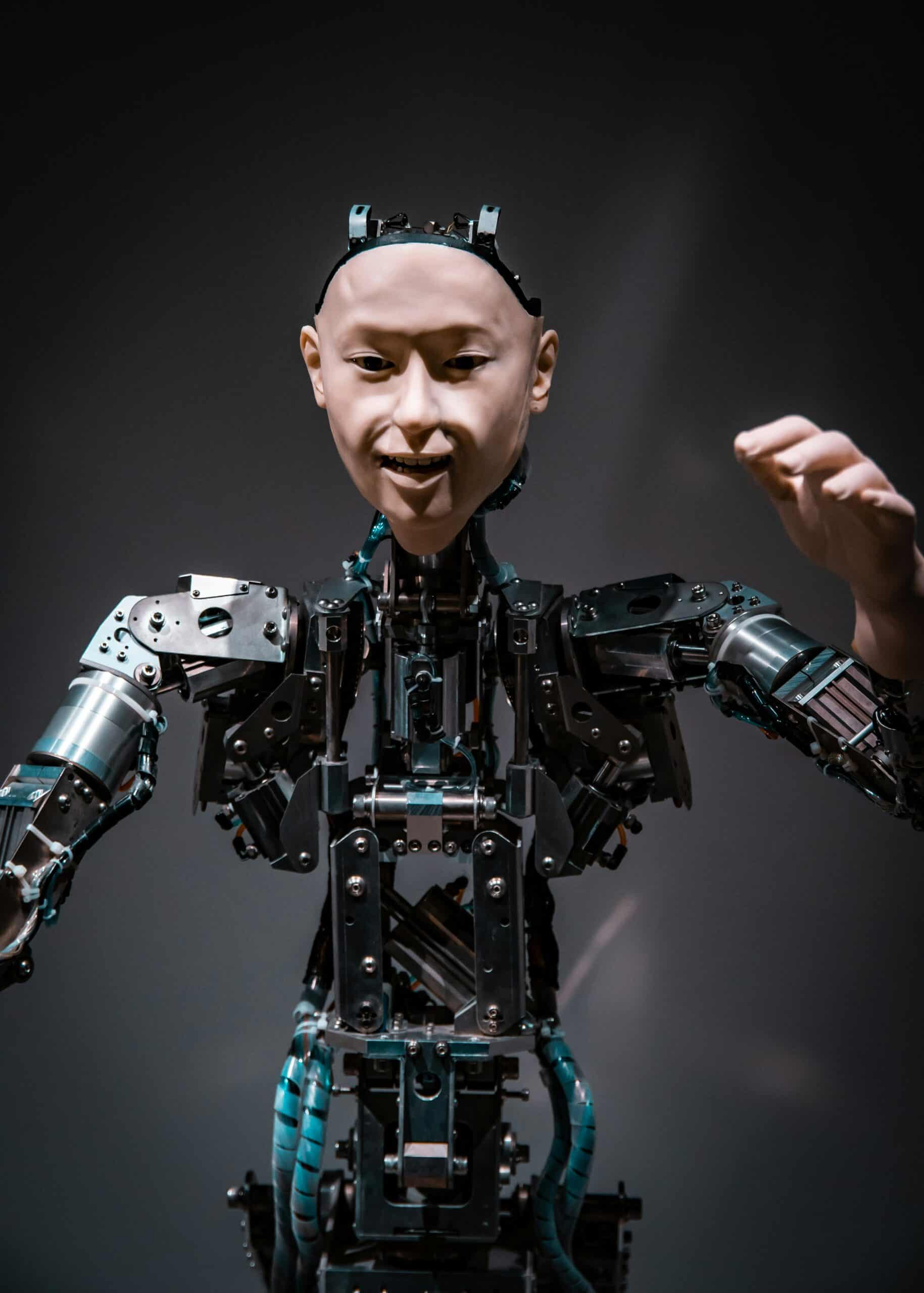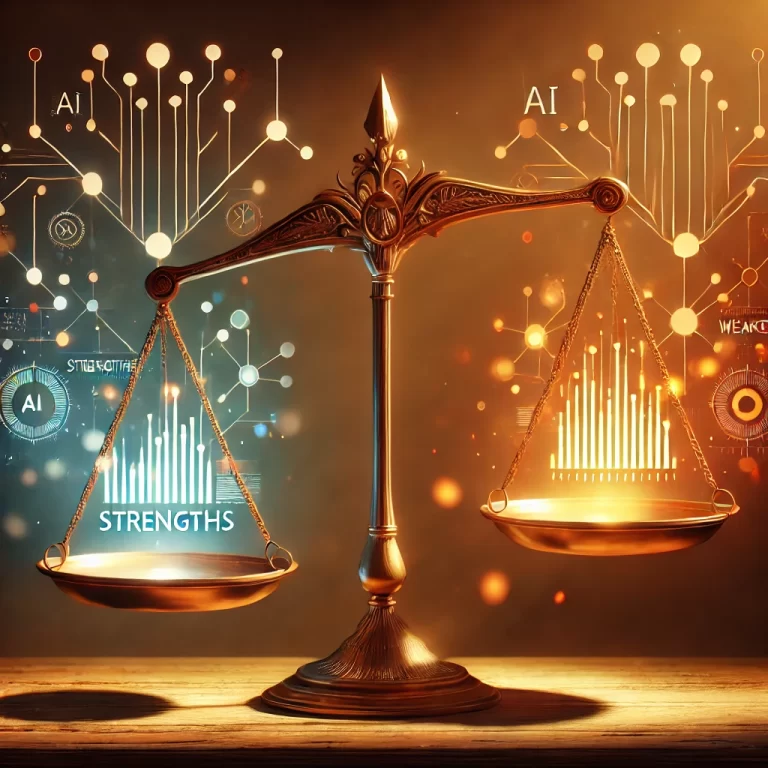Introduction to AI in Personal Development
Exploring the use of AI for self-improvement opens up a world of possibilities for lifelong learners. Artificial Intelligence has the power to revolutionize how I learn and grow, making my personal development journey more efficient and tailored to my unique needs.

Revolutionizing Learning with AI
AI holds the potential to tailor learning materials and activities to meet my individual needs. This means I can engage with personalized content that keeps me motivated and focused. With AI, my learning journey becomes more interactive and adaptive, enhancing my overall experience.
Imagine having an intelligent tutor who knows my strengths and weaknesses. AI-powered data analytics can track my progress, identify areas where I need improvement, and offer tailored interventions to ensure my success (URBE University). This continuous feedback loop helps me stay on track and achieve my learning goals more efficiently.
Benefits of AI in Personal Growth
Using AI for self-improvement comes with a myriad of benefits. It allows me to work smarter, not harder. For example, automation and AI-driven tools can enhance my performance by up to 40%, which means I can accomplish more in less time (The Skills Network).
Here are some key advantages of incorporating AI into my personal growth journey:
- Personalized Learning: AI customizes content and activities to match my learning style and pace.
- Efficient Content Creation: Tools like AI text generators can help me quickly produce high-quality essays, emails, and more, boosting my creativity.
- Insightful Analytics: AI provides valuable insights into my progress, enabling me to focus on areas that need improvement.
- Enhanced Performance: Automation helps me streamline tasks and increase productivity.
By leveraging these benefits, I can make significant strides in my personal development journey. Whether it’s through AI-driven personal development strategies or exploring ai solutions for self-motivation, the integration of AI in my life promises to be a game-changer.
For more on how AI can transform personal growth, check out our detailed guide on artificial intelligence in self-improvement.

AI Tools for Self-Improvement
Harnessing AI for personal growth can be incredibly empowering. Here, I’ll explore some AI tools that are making waves in self-improvement: Intelligent Tutoring Systems, Language Learning Apps, and AI-Driven Fitness Apps.
Intelligent Tutoring Systems
Intelligent Tutoring Systems (ITS) are like having a personal tutor available 24/7. These systems use AI to engage in real-time conversations with learners, providing personalized guidance and support. This helps enhance understanding of complex concepts and promotes self-directed learning. Here’s a look at some ITS features:
| Feature | Benefit |
|---|---|
| Real-time Feedback | Immediate corrections and suggestions |
| Personalization | Adapts to individual learning needs |
| 24/7 Availability | Learn at your own pace, anytime |
These systems can radically transform the way I learn, providing support that is tailored specifically to my needs. For more on artificial intelligence in self-improvement, check out the link.
Language Learning Apps
AI-powered language learning apps like Babbel and Rosetta Stone are revolutionizing the way I acquire new languages. These applications provide real-time feedback on my pronunciation and grammar, adapt to my learning style, and track my progress. Below is a comparison of some popular features:
| App | Real-time Feedback | Adaptability | Progress Tracking |
|---|---|---|---|
| Babbel | Yes | High | Yes |
| Rosetta Stone | Yes | High | Yes |
By integrating these applications into my learning routine, I can efficiently and effectively work towards language proficiency. Discover more about machine learning for self-help in our detailed guide.
AI-Driven Fitness Apps
AI-based fitness apps like Freeletics and Fitbod can customize workout plans specifically for me, based on my goals, fitness level, and available equipment. These plans adapt as I progress, ensuring that my workouts remain challenging and effective.
| App | Custom Workouts | Adapts to Progress | Personalized Goals |
|---|---|---|---|
| Freeletics | Yes | Yes | Yes |
| Fitbod | Yes | Yes | Yes |
Using these apps ensures that my fitness journey is both efficient and tailored to my unique needs. For more insights into ai-driven personal development strategies, check out the link.
By incorporating these AI tools into my daily routine, I can unlock new potential in learning, language acquisition, and fitness. Each tool offers a unique way to harness the power of AI for personal growth, helping me become the best version of myself.
Personalization through AI
Exploring how AI helps me achieve self-improvement and personal growth is a fascinating journey. Let’s dive into how AI tools are revolutionizing career guidance, language learning, and skincare and beauty routines.
AI in Career Guidance
When I think about my career path, AI offers invaluable assistance in making informed decisions. Tools like Careerdekho AI are designed to provide better clarity on long-term career prospects (Medium). These intelligent systems analyze my skills, interests, and market trends to suggest the best career opportunities for me. They can even recommend courses and certifications that align with my career goals.
| AI Tool | Function |
|---|---|
| Careerdekho AI | Provides career suggestions based on personal skills and interests |
To learn more about how AI revolutionizes career guidance, check out ai-driven personal development strategies.
Customized Language Learning
Learning a new language can be daunting, but AI-powered language learning apps make it much more manageable for me. Apps like Babbel and Rosetta Stone use AI to provide real-time feedback on my pronunciation and grammar. They adapt to my individual learning style and track my progress to ensure that I become proficient faster (LinkedIn).
| Language App | AI Feature |
|---|---|
| Babbel | Real-time feedback on pronunciation |
| Rosetta Stone | Adaptive learning style tracking |
If you’re interested in exploring more about AI in language learning, visit artificial intelligence in self-improvement.
Skincare and Beauty AI Tools
AI has also made significant strides in personal care. I can now rely on AI-powered tools like Glow AI to generate personalized skincare routines. These tools analyze my skin type, concerns, and preferences to recommend the best products and routines.
| AI Tool | Function |
|---|---|
| Glow AI | Generates personalized skincare routines |
For a detailed look into how AI can enhance my beauty regimen, check out ai solutions for self-motivation.
By harnessing the power of AI across various aspects of my life, I can make more informed decisions and achieve my personal development goals efficiently. Whether it’s through career guidance, language learning, or skincare routines, AI ensures that I have customized and effective solutions at my fingertips.
AI for Mental Well-being
Harnessing the capabilities of AI for mental health can significantly enhance our personal development journey. Let’s explore how AI can support and improve mental well-being.
AI Chatbots for Mental Health
AI-powered mental health chatbots like Woebot and Wysa offer a reliable source of support for managing stress, anxiety, and depression. Available 24/7, these chatbots provide personalized coping strategies and a non-judgmental space to discuss feelings.
| Chatbot | Key Features | Accessibility |
|---|---|---|
| Woebot | Cognitive behavioral therapy techniques, daily check-ins | 24/7 |
| Wysa | Mood tracking, guided self-help, talk therapy | 24/7 |
These AI chatbots can be a great addition to a person’s mental health toolkit, offering immediate support and resources when needed.
Fitness Apps for Personal Well-being
AI-driven fitness apps such as Freeletics and Fitbod are designed to create customized workout plans that suit individual goals, fitness levels, and available equipment. These apps adapt routines as users progress, ensuring workouts remain effective and engaging (LinkedIn).
| App | Features | Adaptability |
|---|---|---|
| Freeletics | Personalized fitness plans, AI coaching | High |
| Fitbod | Workout tracking, exercise recommendations | High |
Incorporating an AI fitness app into your routine can simplify your fitness journey, making it easier to stay motivated and on track.
Balancing AI and Human Support
While AI-driven tools provide substantial support for mental well-being, balancing AI and human interaction is crucial. AI can assist in various tasks but does not replace the empathy and understanding that human connections offer. AI-based virtual assistants like Google Assistant and Siri can assist in scheduling tasks, setting reminders, and managing daily activities, ultimately streamlining routines and boosting productivity.
For example, using AI to manage daily tasks can free up time to focus on self-care and building meaningful human relationships. For more insights on utilizing AI for self-improvement, you can explore our article on artificial intelligence in self-improvement.
By integrating AI tools with traditional forms of support, individuals can create a balanced approach to mental well-being, ensuring they get the best of both worlds. If you are curious about AI-driven personal development strategies, check our detailed guide on ai-driven personal development strategies.

Risks and Challenges of AI
While AI offers numerous benefits for personal growth, it also presents several risks and challenges. These include issues related to transparency and bias in AI, job displacement due to automation, and social manipulation with AI algorithms.
Transparency and Bias in AI
When using AI for self-improvement, one of the significant challenges is ensuring transparency and minimizing bias. AI and deep learning models are often complex and opaque, making it difficult to understand the rationale behind their decisions. This lack of transparency can lead to mistrust and misuse. Former employees of OpenAI and Google DeepMind have raised concerns about these companies concealing the potential dangers of their AI tools, highlighting the need for better explainability and accountability (Built In).
Additionally, AI-generated content, such as deepfakes, can spread misinformation and manipulate public opinion. Detecting and combating AI-generated false information is crucial to maintaining the integrity of digital content. When considering artificial intelligence in self-improvement, it’s essential to use well-vetted tools that prioritize transparency and fairness.
Job Displacement Due to Automation
Another challenge of AI is the potential for job displacement across various sectors. Automation can lead to significant job losses, especially for low-skilled workers. For instance, AI could automate tasks that account for up to 30% of the hours currently worked in the U.S. economy by 2030, potentially leading to the loss of 300 million full-time jobs. Black and Hispanic employees, in particular, are vulnerable to these changes (Built In).
To mitigate the impact of AI on employment, it is vital for the workforce to adapt by acquiring new skills and embracing continuous learning. Resources like machine learning for self-help can offer invaluable support in navigating these transitions.
Social Manipulation with AI Algorithms
Another risk arises from the use of AI algorithms in social media and other platforms. These algorithms can manipulate user behavior by curating content based on previous interactions. Platforms like TikTok have come under scrutiny for failing to filter out harmful or inaccurate content, making it difficult for users to differentiate between credible and false information.
AI algorithms’ ability to influence public opinion and behavior underscores the importance of ethical guidelines and oversight. Leveraging ai-driven personal development strategies responsibly can help mitigate these risks.
Understanding these risks and challenges is essential for using AI effectively and ethically in personal development. It helps to stay informed and critically evaluate the AI tools we choose to integrate into our lives. For additional strategies, consider exploring AI solutions for self-motivation.
| Risk | Description | Source |
|---|---|---|
| Transparency and Bias | AI models can be opaque, leading to mistrust and misuse. | Built In |
| Job Displacement | AI could automate up to 30% of work hours by 2030, leading to significant job losses. | Forbes |
| Social Manipulation | AI algorithms can influence user behavior and spread misinformation. | Built In |
Exploring these challenges can offer a balanced perspective on using AI for self-improvement, helping individuals make informed decisions.
Examples of AI for Personalization
Exploring the world of AI for self-improvement, there are fascinating applications tailored to various aspects of our daily lives. Here are some remarkable examples of how AI is making things more personalized than ever.
Virtual Stylist for Fashion
Imagine having a personal fashion consultant at your fingertips. AI-powered virtual stylists are making this possible. Companies like Thread, a UK-based fashion service, use artificial intelligence to provide tailor-made clothing recommendations based on individual style preferences (Forbes). Customers receive weekly outfit suggestions that they can upvote or downvote, helping the AI to refine future recommendations. This makes choosing outfits not only easier but also more aligned with personal taste.
For more insights into how AI can revolutionize your fashion choices, check our section on artificial intelligence in self-improvement.
AI Vocabulary Learning Apps
Learning new words can be fun and highly personalized with AI-powered apps. Sesame Street has developed an AI-driven vocabulary learning application tailored for children. This app customizes learning exercises based on each child’s current vocabulary and reading level. As the child progresses, the app adjusts the difficulty and content of exercises. Schools using this technology have reported significant improvements in students’ reading and vocabulary skills.
Experience better and more engaging language learning by exploring ai-driven personal development strategies.
| Feature | Sesame Street AI Vocabulary App |
|---|---|
| Customization | Tailored learning exercises |
| Progress Tracking | Adjusts based on child’s progress |
| Outcome | Improved reading and vocabulary skills |
AI in Health and Wellness
Staying fit and healthy is easier and more personalized thanks to AI. Under Armour’s Record app utilizes AI to collect and analyze health data, including physical activity, sleep patterns, and diet. The app acts like a personal trainer, offering customized fitness recommendations and tracking workout effectiveness. By understanding individual habits and needs, it provides more efficient and personalized health advice.
For more ways to boost your well-being with technology, check out our section on machine learning for self-help.
AI and Learning Platforms
Embracing the power of Artificial Intelligence in learning platforms can significantly enhance personal development and lifelong learning. In this section, I’ll explore how AI is transforming personalized content recommendations, tools for job seekers, and leveraging data-driven insights.
Personalized Content Recommendations
Using AI for self-improvement, educational platforms such as Coursera and edX deploy algorithms to tailor educational content for personalized learning experiences. This customization makes the pursuit of new skills more effective and enjoyable.
| Platform | Key Feature |
|---|---|
| Coursera | Tailored course recommendations |
| edX | Personalized course suggestions |
| Duolingo | Customized learning pathways |
By evaluating your learning patterns and preferences, these platforms suggest courses uniquely suited to your interests and goals. Check out our guide on artificial intelligence in self-improvement for more insights.
AI Tools for Job Seekers
For those seeking career advancement or transitioning into new fields, AI tools play a pivotal role. Job platforms like LinkedIn and Glassdoor use AI to provide job recommendations and tailored career advice based on individual profiles. These platforms analyze your professional history, skills, and preferences to offer relevant job opportunities and courses.
| Platform | AI Feature |
|---|---|
| Personalized job recommendations | |
| Glassdoor | Tailored career advice based on individual profiles |
| Indeed | AI-driven job matching |
Incorporating these tools into your job search can streamline the process and increase your chances of finding the perfect match. Discover more about ai-driven personal development strategies.
Enhancing Data-Driven Insights
AI excels in harnessing data to provide actionable insights. Learning platforms use AI to analyze large datasets, identifying trends and patterns that can help you make informed decisions about your education and career. For example, using data-driven insights, platforms can recommend which courses or skills are currently in demand, helping you stay ahead in your field.
| Data Type | AI Insight Example |
|---|---|
| Learning Trends | Identifying popular courses |
| Career Pathways | Suggesting skills for job market |
| Progress Tracking | Monitoring and adapting learning paths |
Explore how machine learning for self-help and how it can assist you in making data-driven decisions to further your personal growth.
Leveraging AI, learning platforms are revolutionizing the way we pursue personal development. By offering personalized content, career guidance, and data-driven insights, AI empowers lifelong learners to achieve their goals more effectively and efficiently. For more on balancing human and AI interaction in self-development, read about ai solutions for self-motivation.
AI and Sustainable Development Goals
AI Towards Sustainable Development
When I think about how AI can contribute to sustainable development, it’s amazing to see its potential to enable 134 targets across all Sustainable Development Goals (SDGs). However, it’s equally important to note that AI might inhibit 59 targets. The current concentration of AI research often overlooks critical aspects that need careful attention for sustainable development. This is why regulatory insight and oversight are indispensable for AI-based technologies to ensure they are used responsibly (Nature Communications).
Impact of AI on Sustainable Development Goals
AI has a profound impact on various Sustainable Development Goals. In the Economy group of SDGs, AI is projected to positively affect 70% of identified targets. This means AI could significantly contribute to targets related to decent work, industry, and innovation. However, it’s concerning that AI might also exacerbate inequalities, especially within and among nations, by creating larger economic gaps due to unequal access to data resources and technology. This highlights the importance of ensuring equitable access to AI technologies to prevent increased disparities.
| SDG Group | Positive Effect of AI (%) | Negative Effect of AI (%) |
|---|---|---|
| Economy | 70 | Unknown |
| Environment | 93 | Unknown |
In the Environment group of SDGs, AI has the potential to enable 93% of the targets. It can enhance large-scale data analysis for environmental preservation and promote low-carbon energy systems. However, AI’s high energy demands could pose challenges to achieving targets related to climate action, preventing marine pollution, and combating desertification. Thus, while AI offers substantial benefits, it also requires sustainable practices to mitigate its environmental footprint.
Challenges and Opportunities of AI
The role of AI as an enabler for sustainable development outweighs its potential as an inhibitor. However, this is partly due to a publication bias favoring positive results. There is an evident need for long-term studies and ethical AI principles to comprehensively assess AI’s impact on sustainable development (Nature Communications). As I delve into using AI for self-improvement, I recognize the significance of regulatory oversight and comprehensive impact assessments to ensure AI contributes positively to sustainable development. For insights on leveraging AI in personal development, check out our articles on artificial intelligence in self-improvement and ai-driven personal development strategies.






2 Comments
Comments are closed.